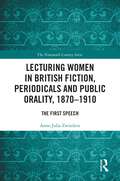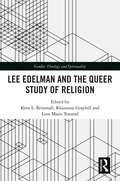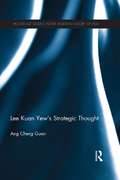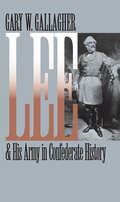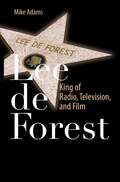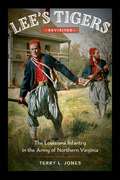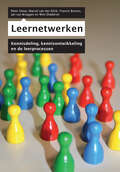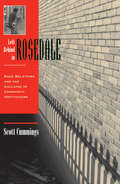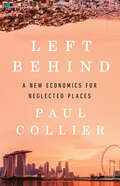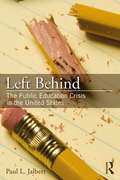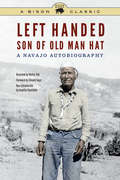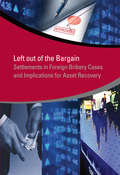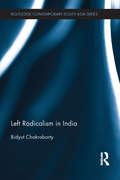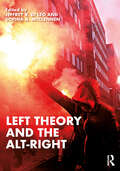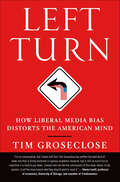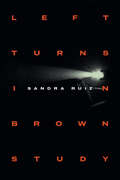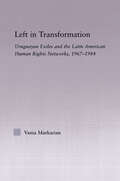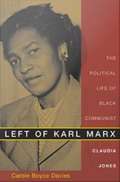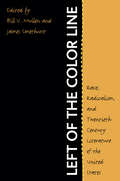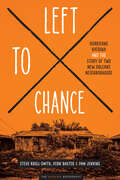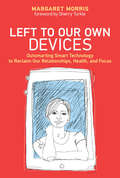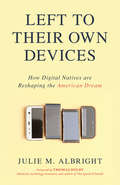- Table View
- List View
Lecturing Women in British Fiction, Periodicals and Public Orality, 1870–1910: The First Speech (The Nineteenth Century Series)
by Anne-Julia ZwierleinThis book examines the emergence of women as audiences and speakers on the British metropolitan lecture circuit and in mass print representations from 1870 to 1910. Bringing together research on Victorian lecturing, periodicals, voice studies and the cultural history of feminism, it sheds new light on the interdependence of orality and print and the rise of the British women’s movement.Sifting through the archives of lecture institutions (the Birkbeck Literary and Scientific Institution, the London Institution and the Royal Institution), penny fiction weeklies and feminist weeklies, New Woman and suffrage novels, autobiographical writings and rhetorical manuals, this book reconstructs the changing mediascape of late Victorian London and treats speech events, in print and on site, as catalysts for democratic participation. Undertaking an archaeology of women’s presence in the lecture hall, it explores conservative fantasies in fiction of the female speaking automaton alongside new writings that transformed women orators from objects of sensation into public agents. By analysing women’s collective self-education in rhetoric and elocution, this book traces the emergence in political fictions of key narrative tropes of oral performance: the surprise encounter in the lecture hall, the moment of conversion during a lecture and the symbolic ‘first speech’ of new suffrage recruits.Drawing on new and extensive primary research, this book intervenes in several flourishing fields of inquiry: literary studies, oral culture studies, sound and voice studies, performance studies, periodical studies and Victorian and Edwardian cultural history.
Lee Edelman and the Queer Study of Religion (Gender, Theology and Spirituality)
by Kent L. Brintnall Linn Marie Tonstad Rhiannon GraybillThis book takes the groundbreaking work of Lee Edelman in queer theory and, for the first time demonstrates its importance and relevance to contemporary theology, biblical studies, and religious studies. It argues that despite extensive interest in Edelman’s work, we have barely begun to understand the significance of Edelman’s ideas both in their own right and with respect to the study of religion. Therefore, it offers fresh approaches to Edelman’s work that necessarily complicate the established interpretations of his thinking. With essays by rising and established scholars, as well as a response by Edelman himself, it contends that by fully engaging Edelman, scholars of religion will have to confront negativity and its consequences in ways that will contribute to reshaping the terrain of scholarship on religion, race, sexuality, and social change. The insights provided in this book are new territory for much of the study of religion. As such, it will be of keen interest to scholars of religious studies, theology and Biblical studies as well as gender studies and queer, feminist, and critical race theory.
Lee Kuan Yew's Strategic Thought (Routledge Studies in the Modern History of Asia)
by Ang Cheng GuanLee Kuan Yew, as the founding father of independent Singapore, has had an enormous impact on the development of Singapore and of Southeast Asia more generally. Even in his 80s he is a key figure who continues to exert considerable influence from behind the scenes. This book presents a comprehensive overview of Lee Kuan Yew’s strategic thought. It charts the development of Singapore over the last six decades, showing how Lee Kuan Yew has steered Singapore to prosperity and success through changing times. It analyses the factors underlying Lee Kuan Yew’s thinking, discusses his own writings and speeches, and shows how his thinking on foreign policy, security and international relations has evolved over time.
Lee and His Army in Confederate History
by Gary W. GallagherWas Robert E. Lee a gifted soldier whose only weaknesses lay in the depth of his loyalty to his troops, affection for his lieutenants, and dedication to the cause of the Confederacy? Or was he an ineffective leader and poor tactician whose reputation was drastically inflated by early biographers and Lost Cause apologists? These divergent characterizations represent the poles between which scholarly and popular opinion on Lee has swung over time. Now, in eight essays, Gary Gallagher offers his own refined thinking on Lee, exploring the relationship between Lee's operations and Confederate morale, the quality of his generalship, and the question of how best to handle his legacy in light of the many distortions that grew out of Lost Cause historiography.Using a host of contemporary sources, Gallagher demonstrates the remarkable faith that soldiers and citizens maintained in Lee's leadership even after his army's fortunes had begun to erode. Gallagher also engages aspects of the Lee myth with an eye toward how admirers have insisted that their hero's faults as a general represented exaggerations of his personal virtues. Finally, Gallagher considers whether it is useful--or desirable--to separate legitimate Lost Cause arguments from the transparently false ones relating to slavery and secession. Was Robert E. Lee a gifted soldier whose only weaknesses lay in the depth of his loyalty to his troops, affection for his lieutenants, and dedication to the cause of the Confederacy? Or was he an ineffective leader and poor tactician whose reputation was drastically inflated by early biographers and Lost Cause apologists? These divergent characterizations represent the poles between which scholarly and popular opinion on Lee has swung over time. In eight essays, Gary Gallagher offers his own refined thinking on Lee, exploring the relationship between Lee's operations and Confederate morale, the quality of his generalship, and the question of how best to assess his legacy in light of the many distortions that grew out of Lost Cause historiography.-->
Lee de Forest
by Mike AdamsThe life-long inventor, Lee de Forest invented the three-element vacuum tube used between 1906 and 1916 as a detector, amplifier, and oscillator of radio waves. Beginning in 1918 he began to develop a light valve, a device for writing and reading sound using light patterns. While he received many patents for his process, he was initially ignored by the film industry. In order to promote and demonstrate his process he made several hundred sound short films, he rented space for their showing; he sold the tickets and did the publicity to gain audiences for his invention. Lee de Forest officially brought sound to film in 1919. Lee De Forest: King of Radio, Television, and Film is about both invention and early film making; de Forest as the scientist and producer, director, and writer of the content. This book tells the story of de Forest's contribution in changing the history of film through the incorporation of sound. The text includes primary source historical material, U.S. patents and richly-illustrated photos of Lee de Forest's experiments. Readers will greatly benefit from an understanding of the transition from silent to audio motion pictures, the impact this had on the scientific community and the popular culture, as well as the economics of the entertainment industry.
Lee's Tigers Revisited: The Louisiana Infantry in the Army of Northern Virginia
by Terry L. JonesIn Lee’s Tigers Revisited, noted Civil War scholar Terry L. Jones dramatically expands and revises his acclaimed history of the approximately twelve thousand Louisiana infantrymen who fought in Robert E. Lee’s Army of Northern Virginia. Sometimes derided as the “wharf rats from New Orleans” and the “lowest scrappings of the Mississippi,” the Louisiana Tigers earned a reputation for being drunken and riotous in camp, but courageous and dependable on the battlefield. Louisiana’s soldiers, some of whom wore colorful uniforms in the style of French Zouaves, reflected the state’s multicultural society, with regiments consisting of French-speaking Creoles and European immigrants. Units made pivotal contributions to many crucial battles—resisting the initial Union onslaught at First Manassas, facilitating Stonewall Jackson’s famous Valley Campaign, holding the line at Second Manassas by throwing rocks when they ran out of ammunition, breaking the Union line temporarily at Gettysburg’s Cemetery Hill, containing the Union breakthrough at Spotsylvania’s Bloody Angle, and leading Lee’s attempted breakout of Petersburg at Fort Stedman. The Tigers achieved equal notoriety for their outrageous behavior off the battlefield, so much so that sources suggest no general wanted them in his command. By the time of Lee’s surrender at Appomattox, there were fewer than four hundred Louisiana Tigers still among his troops. Lee’s Tigers Revisited uses letters, diaries, memoirs, newspaper articles, and muster rolls to provide a detailed account of the origins, enrollments, casualties, and desertion rates of these soldiers. Illustrations—including several maps newly commissioned for this edition—chart the Tigers’ positions on key battlefields in the tumultuous campaigns throughout Virginia. By utilizing first-person accounts and official records, Jones provides the definitive study of the Louisiana Tigers and their harrowing experiences in the Civil War.
Leernetwerken
by Jan Van Bruggen Wim Didderen Francis Brouns Peter Sloep Marcel Van KlinkLeernetwerken is samengesteld werk en bestemd voor HR-development
Left Bank: Art, Passion, and the Rebirth of Paris, 1940–50
by Agnès PoirierAn incandescent group portrait of the midcentury artists and thinkers whose lives, loves, collaborations, and passions were forged against the wartime destruction and postwar rebirth of ParisIn this fascinating tour of a celebrated city during one of its most trying, significant, and ultimately triumphant eras, Agnes Poirier unspools the stories of the poets, writers, painters, and philosophers whose lives collided to extraordinary effect between 1940 and 1950. She gives us the human drama behind some of the most celebrated works of the 20th century, from Richard Wright’s Native Son, Simone de Beauvoir's The Second Sex, and James Baldwin's Giovanni's Room to Samuel Beckett's Waiting for Godot and Saul Bellow's Augie March, along with the origin stories of now legendary movements, from Existentialism to the Theatre of the Absurd, New Journalism, bebop, and French feminism.We follow Arthur Koestler and Norman Mailer as young men, peek inside Picasso’s studio, and trail the twists of Camus's Sartre's, and Beauvoir’s epic love stories. We witness the births and deaths of newspapers and literary journals and peer through keyholes to see the first kisses and last nights of many ill-advised bedfellows. At every turn, Poirier deftly hones in on the most compelling and colorful history, without undermining the crucial significance of the era. She brings to life the flawed, visionary Parisians who fell in love and out of it, who infuriated and inspired one another, all while reconfiguring the world's political, intellectual, and creative landscapes. With its balance of clear-eyed historical narrative and irresistible anecdotal charm, Left Bank transports readers to a Paris teeming with passion, drama, and life.
Left Behind In Rosedale: Race Relations And The Collapse Of Community Institutions
by Scott CummingsLeft Behind in Rosedale is a stunning analysis of community and neighborhood decline. Through creative application of ethnographic analysis, participant observation, and in-depth interviews, Scott Cummings' unique book breathes human life into one of the most serious problems facing the nation's cities: the ghettoization of urban neighborhoods. Transcending demographic and statistical analysis, he vividly and passionately tells the story of ghettoization by explaining what happens to people's lives during the process of racial transition and change.Cummings takes the reader on a distressing historical journey, detailing the progressive decline of one community's culture. Along the way, he explains and explores the futile attempts of its white elderly residents to maintain their traditional way of life. He then moves to an examination of the black youth who victimize the elderly and explains the family and gang context of their actions. Moving full circle some fifteen years later, after the collapse of Rosedale is nearly complete, Cummings documents the similar plight facing the black elderly and details the grinding poverty that has enveloped the entire community. He concludes by evaluating the community's effort to revitalize itself and explains why these efforts failed.Cummings uses the case of Rosedale as a window to explore and critically evaluate the evolution of American urban policy over the past forty years. He concludes that many of our efforts to solve urban problems have actually made them worse. This book should be read by liberals and conservatives alike, neighborhood and community activists, politicians and reformers, urban planners of American cities, and citizens who want to know why government efforts to revitalize urban neighborhoods have accomplished so little.
Left Behind: A New Economics for Neglected Places
by Paul CollierFrom the bestselling author of The Bottom Billion, the fate of the poorest regions of the world–some of which exist in the richest nations–is examined. Using examples of the &“left behind&” regions, renowned development economist Paul Collier shows that centralized western economies have been the most ineffective to alleviate poverty—even if nationally the country seems to be growing. In Left Behind, Collier examines how the assumption that any impoverished area will find a way to progress through market forces has devastated nations all over the world. With keen insight, he draws lessons from such disparate fields as behavioral psychology, evolutionary biology, and moral philosophy to explain how we can adapt to the needs of individual economies in order to build a brighter and fairer global future.
Left Behind: The Democrats' Failed Attempt to Solve Inequality
by Lily GeismerThe 40-year history of how Democrats chose political opportunity over addressing inequality—and how the poor have paid the priceFor decades, the Republican Party has been known as the party of the rich: arguing for &“business-friendly&” policies like deregulation and tax cuts. But this incisive political history shows that the current inequality crisis was also enabled by a Democratic Party that catered to the affluent.The result is one of the great missed opportunities in political history: a moment when we had the chance to change the lives of future generations and were too short-sighted to take it.Historian Lily Geismer recounts how the Clinton-era Democratic Party sought to curb poverty through economic growth and individual responsibility rather than asking the rich to make any sacrifices. Fueled by an ethos of &“doing well by doing good,&” microfinance, charter schools, and privately funded housing developments grew trendy. Though politically expedient and sometimes profitable in the short term, these programs fundamentally weakened the safety net for the poor.This piercingly intelligent book shows how bygone policy decisions have left us with skyrocketing income inequality and poverty in America and widened fractures within the Democratic Party that persist to this day.
Left Behind: The Public Education Crisis in the United States
by Paul L. JalbertThis book addresses the harmful influences that the cultural, social, economic, political and ideological dimensions, in current ‘American’ society, have upon the delivery of elementary, secondary and university education. It examines the effects of poverty, funding at the local, state and federal levels and racial and ethnic discrimination. Arguing against the continuation of standardized testing—an ill-conceived methodology to measure the performance of children—the author advocates more one-on-one teaching and evaluation. He charges that students’ rights to education are not respected and, in elementary and high school, receive little in the way of instruction that translates into life skills and proposes what some of those skills should be. A critique of the extreme ethnocentric approach to education in the United States, Left Behind advocates strong instruction in the Humanities and foreign languages and the establishment of education abroad as a permanent program in high school and university. The author identifies Capitalism as the basic influence that, in the form of employing ‘business model’ constructs, has slowly transformed our children into obedient consumers. Physical Education has waned and become a major contributor to adolescent obesity. Seeking to replace children’s complacency with critical thinking instruction, the author demonstrates how the corporate mass media occupy their minds. He also fears the erosion of the profession of teaching by an ‘online’ instruction frenzy. The book explores the possibilities for a viable nation-wide education institution, in which decision-making is in the hands of teachers, parents and education experts, instead of politicians and business people. The remedies that could be taken up by ordinary people are accessible at the commonsense level; what prevents change are the lack of political will and economic greed, bolstered by the ideological power of the mass media.
Left Handed, Son of Old Man Hat, Bison Classic Edition: A Navajo Autobiography
by Edward Sapir Left Handed Walter Dyk Jennifer DenetdaleWith a simplicity as disarming as it is frank, Left Handed tells of his birth in the spring of 1868 “when the cottonwood leaves were about the size of [his] thumbnail,” of family chores such as guarding the sheep near the hogan, and of his sexual awakening. As he grows older, his account turns to life in the open: nomadic cattle-raising, farming, trading, communal enterprises, tribal dances and ceremonies, lovemaking, and marriage. As Left Handed grows in understanding and stature, the accumulated wisdom of his people is revealed to him. He learns the Navajo lifeway, which is founded on the principles of honesty, foresightedness, and self-discipline. The style of the narrative is almost biblical in its rhythms, but biblical, too, in many respects, is the traditional way of life it recounts.
Left Out of the Bargain
by Ji Won Park Jeanne M. Hauch Agustin Flah Dorothee Gottwald Francisca M.U. Fernando Jacinta Anyango Oduor Marianne Mathias Oliver StolpeOver the past decade, countries have increasingly used settlements-that is, any procedure short of a full trial-to conclude foreign bribery cases and have imposed billions in monetary sanctions. There exists a gap in knowledge, however, regarding settlement practices around the world and the disposition of these monetary sanctions-notably through the lens of recovery of stolen assets. Left out of the Bargain, a study by the Stolen Asset Recovery Initiative (StAR), provides an overview of settlement practices by civil and common law countries that have been active in the fight against foreign bribery. Using the United Nations Convention against Corruption (UNCAC) as its point of reference, the study addresses concerns voiced by the international community: What happens to the money associated with the settlements, and is it being returned to those most directly harmed by the corrupt practices? And what can be done to assist those countries harmed by foreign bribery? Left out of the Bargain has found that 395 settlement cases took place between 1999 and mid-2012, resulting in a total of US$6.9 billion in monetary sanctions imposed against companies and individuals. Of this amount, nearly US$6 billion came from settlements that took place in a country different from that of the allegedly bribed foreign public officials. But only about US$197 million, or 3 percent, has been returned or ordered returned to the countries whose officials were accused of accepting bribes. Left out of the Bargain urges countries whose officials were allegedly bribed to intensify their efforts to investigate and prosecute the providers and recipients of foreign bribes, hence improving these countries' prospects for recovery of assets lost through corruption. The study also calls for more proactive international cooperation and coordination to ensure that all affected countries are afforded the opportunity to seek redress for harms suffered and for the recovery of assets-thus fulfilling the principles set out in UNCAC.
Left Radicalism in India (Routledge Studies in South Asian Politics)
by Bidyut ChakrabartyLeft radicalism in India was rooted in the nationalist movement and was set in motion in the 1920s with the formation of the communist party. The communist movement manifested itself differently in each phase of India’s political history and Communism continues to remain a meaningful alternative ideological discourse in India. This book examines left politics in India focusing on its rise, consolidation and relative decline in the present century. Left radicalism in India is a distinct ideological phenomenon which is articulated in two complementary ways: while the parliamentary left remains social democratic in character, its bête noire, the left wing extremists, continue to uphold the classical Marxist, Leninist and Maoist notion of violent revolution. By concentrating on the nature and also activities of these two versions of left radicalism, this book is a thorough study of the phenomenon. The author analyses the states of Kerala, West Bengal and Tripura and presents a variety of case studies of communist movements. He argues that the political power of the left parties depends on the degree to which they have built organizational strength, political hegemony and a broad social base through legal and extra-parliamentary struggles. An in-depth study of socio-economic circumstances that remain critical in conceptualizing radical extremism, Left Radicalism in India will be of interest to those studying Indian Politics, South Asian History, Development Studies and Global Politics.
Left Theory and the Alt-Right
by Sophia A. McClennen Di Leo, Jeffrey R.The alt-right movement in the United States has actively been endorsing the use of left theory to achieve its ends—and with varying degrees of success. Tracing occasions where figures on the alt-right reference left theory, this volume asks if the alt-right’s reference of left theory is just bad reading, or are there troubling ways that certain types of left theory encourage such interpretations? What if the connections between left theory and the alt-right lie in the shared disdain for certain types of institutions, structures of power, and the status quo? Are there lessons to be learned in what can often appear as an overlapping desire to deconstruct concepts like truth, justice, freedom, and democracy? Drawing on the longer history of right-wing readings of left theory, this volume seeks to unpack these recent developments and consider their impact on the future of theory.
Left Turn: How Liberal Media Bias Distorts the American Mind
by Tim GrosecloseA leading political science professor provides scientific proof of media bias in this sure-to-be-controversial bookDr. Tim Groseclose, a professor of political science and economics at UCLA, has spent years constructing precise, quantitative measures of the slant of media outlets. He does this by measuring the political content of news, as a way to measure the PQ, or "political quotient" of voters and politicians. Among his conclusions are: (i) all mainstream media outlets have a liberal bias; and (ii) while some supposedly conservative outlets—such the Washington Times or Fox News' Special Report—do lean right, their conservative bias is less than the liberal bias of most mainstream outlets. Groseclose contends that the general leftward bias of the media has shifted the PQ of the average American by about 20 points, on a scale of 100, the difference between the current political views of the average American, and the political views of the average resident of Orange County, California or Salt Lake County, Utah. With Left Turn readers can easily calculate their own PQ—to decide for themselves if the bias exists. This timely, much-needed study brings fact to this often overheated debate.
Left Turns in Brown Study (Writing Matters!)
by Sandra RuizIn Left Turns in Brown Study Sandra Ruiz offers a poetic-theoretical inquiry into the interlacing forms of study and mourning. Drawing on Black and Brown activism and theory, Ruiz interweaves poetry, memoir, lyrical essay, and vignettes to examine study as an emancipatory practice. Proposing “brown study” as key for understanding how Brownness harbors loss and suffering along with the possibility for more abundant ways of living, Ruiz invites readers to turn left into the sounds, phrases, and principles of anticolonial ways of reading, writing, citing, and listening. In doing so, Ruiz engages with a panoply of hauntings, ghosts, and spectral presences, from deceased teachers, illiterate ancestors, and those lost to unnatural disasters to all those victims of institutional and colonial violence. Study is shared movement and Brownness lives in citation. Conceptual, poetic, and unconventional, this book is crucial for all those who theorize minoritarian literary aesthetics and think through utopia, queer possibility, and the entwinement of forms.
Left in Transformation: Uruguayan Exiles and the Latin American Human Rights Network, 1967 -1984
by Vania MarkarianThis book takes an innovative look at international relations. Focusing on the worldwide campaign against abuses by the right-wing authoritarian regime in Uruguay (1973-1984), it explores how norms and ideas interact with political interests, both global and domestic. It examines joint actions by differently-motivated actors such as the leftist activists who had to flee Uruguay in these years, the Organization of American States, The United Nations, Amnesty International, and the United States. It traces language and procedures for making their claims. The chief goal, however, is to peruse the specific reasons that led these actors to endorse the central core of liberal rights that gave foundation to this system. A close examination of the available documents shows that even as they joined efforts to protest abuses, they were still pursuing their individual agendas, which is often overlooked in the existing scholarship on human rights transnational activism. The book pays special attention to the Uruguayan exiles, analyzing why and how leftist activists and leaders adopted the human rights language, which had so far been used to attack communism in the context of the Cold War.
Left of Karl Marx: The Political Life of Black Communist Claudia Jones
by Carole Boyce DaviesIn Left of Karl Marx, Carole Boyce Davies assesses the activism, writing, and legacy of Claudia Jones (1915-1964), a pioneering Afro-Caribbean radical intellectual, dedicated communist, and feminist. Jones is buried in London's Highgate Cemetery, to the left of Karl Marx--a location that Boyce Davies finds fitting given how Jones expanded Marxism-Leninism to incorporate gender and race in her political critique and activism. Claudia Cumberbatch Jones was born in Trinidad. In 1924, she moved to New York, where she lived for the next thirty years. She was active in the Communist Party from her early twenties onward. A talented writer and speaker, she traveled throughout the United States lecturing and organizing. In the early 1950s, she wrote a well-known column, "Half the World," for the Daily Worker. As the U. S. government intensified its efforts to prosecute communists, Jones was arrested several times. She served nearly a year in a U. S. prison before being deported and given asylum by Great Britain in 1955. There she founded The West Indian Gazette and Afro-Asian Caribbean News and the Caribbean Carnival, an annual London festival that continues today as the Notting Hill Carnival. Boyce Davies examines Jones's thought and journalism, her political and community organizing, and poetry that the activist wrote while she was imprisoned. Looking at the contents of the FBI file on Jones, Boyce Davies contrasts Jones's own narration of her life with the federal government's. Left of Karl Marx establishes Jones as a significant figure within Caribbean intellectual traditions, black U. S. feminism, and the history of communism.
Left of the Color Line
by James Smethurst Bill V. MullenThis collection of fifteen new essays explores the impact of the organized Left and Leftist theory on American literature and culture from the 1920s to the present. In particular, the contributors explore the participation of writers and intellectuals on the Left in the development of African American, Chicano/Chicana, and Asian American literature and culture. By placing the Left at the center of their examination, the authors reposition the interpretive framework of American cultural studies. Tracing the development of the Left over the course of the last century, the essays connect the Old Left of the pre-World War II era to the New Left and Third World nationalist Left of the 1960s and 1970s, as well as to the multicultural Left that has emerged since the 1970s. Individual essays explore the Left in relation to the work of such key figures as Ralph Ellison, T. S. Eliot, Chester Himes, Harry Belafonte, Americo Paredes, and Alice Childress. The collection also reconsiders the role of the Left in such critical cultural and historical moments as the Harlem Renaissance, the Cold War, and the Black Arts Movement of the 1960s and 1970s. The contributors are Anthony Dawahare, Barbara Foley, Marcial Gonzalez, Fred Ho, William J. Maxwell, Bill V. Mullen, Cary Nelson, B. V. Olguin, Rachel Rubin, Eric Schocket, James Smethurst, Michelle Stephens, Alan Wald, and Mary Helen Washington. Contributors:Anthony Dawahare, California State University, Northridge (Northridge, Calif.)Barbara Foley, Rutgers University (Newark, N.J.)Marcial Gonzalez, University of California, Berkeley (Berkeley, Calif.)Fred Ho, New York, N.Y.William J. Maxwell, University of Illinois at Urbana-Champaign (Urbana-Champaign, Ill.)Bill V. Mullen, University of Texas at San Antonio (San Antonio, Tex.)Cary Nelson, University of Illinois at Urbana-Champaign (Urbana-Champaign, Ill.)B. V. Olguin, University of Texas at San Antonio (San Antonio, Tex.)Rachel Rubin, University of Massachusetts-Boston (Boston, Mass.)Eric Schocket, Hampshire College (Amherst, Mass.)James Smethurst, University of Massachusetts-Amherst (Amherst, Mass.)Michelle Stephens, Mount Holyoke College (South Hadley, Mass.)Alan Wald, University of Michigan (Ann Arbor, Mich.)Mary Helen Washington, University of Maryland (College Park, Md.)-->
Left to Chance: Hurricane Katrina and the Story of Two New Orleans Neighborhoods (The Katrina)
by Steve Kroll-Smith Vern BaxterThis in-depth study of two black neighborhoods in the wake of Hurricane Katrina vividly captures the struggle and uncertainty in the process of rebuilding. Hurricane Katrina was the worst urban flood in American history, a disaster that destroyed nearly the entire physical landscape of a city, as well as the mental and emotional maps that people use to navigate their everyday lives. Left to Chance takes us into two African American neighborhoods—working-class Hollygrove and middle-class Pontchartrain Park—to learn how their residents have experienced &“Miss Katrina&” and the long road back to normal life. The authors spent several years gathering firsthand accounts of the flooding, the rushed evacuations that turned into weeks- and months-long exile, and the often confusing and exhausting process of rebuilding damaged homes in a city whose local government had all but failed. As the residents&’ stories make vividly clear, government and social science concepts such as &“disaster management,&” &“restoring normality,&” and &“recovery&” have little meaning for people whose worlds were washed away in the flood. For the neighbors in Hollygrove and Pontchartrain Park, life in the aftermath of Katrina has been a passage from all that was familiar and routine to an ominous world filled with existential uncertainty. Recovery and rebuilding become processes imbued with mysteries, accidental encounters, and hasty adaptations, while victories and defeats are left to chance.
Left to Chance: Hurricane Katrina and the Story of Two New Orleans Neighborhoods (The Katrina)
by Steve Kroll-Smith Vern BaxterThis in-depth study of two black neighborhoods in the wake of Hurricane Katrina vividly captures the struggle and uncertainty in the process of rebuilding. Hurricane Katrina was the worst urban flood in American history, a disaster that destroyed nearly the entire physical landscape of a city, as well as the mental and emotional maps that people use to navigate their everyday lives. Left to Chance takes us into two African American neighborhoods—working-class Hollygrove and middle-class Pontchartrain Park—to learn how their residents have experienced &“Miss Katrina&” and the long road back to normal life. The authors spent several years gathering firsthand accounts of the flooding, the rushed evacuations that turned into weeks- and months-long exile, and the often confusing and exhausting process of rebuilding damaged homes in a city whose local government had all but failed. As the residents&’ stories make vividly clear, government and social science concepts such as &“disaster management,&” &“restoring normality,&” and &“recovery&” have little meaning for people whose worlds were washed away in the flood. For the neighbors in Hollygrove and Pontchartrain Park, life in the aftermath of Katrina has been a passage from all that was familiar and routine to an ominous world filled with existential uncertainty. Recovery and rebuilding become processes imbued with mysteries, accidental encounters, and hasty adaptations, while victories and defeats are left to chance.
Left to Our Own Devices: Outsmarting Smart Technology to Reclaim Our Relationships, Health, and Focus (The\mit Press Ser.)
by Margaret E. MorrisUnexpected ways that individuals adapt technology to reclaim what matters to them, from working through conflict with smart lights to celebrating gender transition with selfies.We have been warned about the psychological perils of technology: distraction, difficulty empathizing, and loss of the ability (or desire) to carry on a conversation. But our devices and data are woven into our lives. We can't simply reject them. Instead, Margaret Morris argues, we need to adapt technology creatively to our needs and values. In Left to Our Own Devices, Morris offers examples of individuals applying technologies in unexpected ways—uses that go beyond those intended by developers and designers. Morris examines these kinds of personalized life hacks, chronicling the ways that people have adapted technology to strengthen social connection, enhance well-being, and affirm identity. Morris, a clinical psychologist and app creator, shows how people really use technology, drawing on interviews she has conducted as well as computer science and psychology research. She describes how a couple used smart lights to work through conflict; how a woman persuaded herself to eat healthier foods when her photographs of salads garnered “likes” on social media; how a trans woman celebrated her transition with selfies; and how, through augmented reality, a woman changed the way she saw her cancer and herself. These and the many other “off-label” adaptations described by Morris cast technology not just as a temptation that we struggle to resist but as a potential ally as we try to take care of ourselves and others. The stories Morris tells invite us to be more intentional and creative when left to our own devices.
Left to Their Own Devices: How Digital Natives Are Reshaping the American Dream
by Julie M. AlbrightA sociologist explores the many ways that digital natives' interaction with technology has changed their relationship with people, places, jobs, and other stabilizing structures and created a new way of life that is at odds with the American Dream of past generations.Digital natives are hacking the American Dream. Young people brought up with the Internet, smartphones, and social media are quickly rendering old habits, values, behaviors, and norms a distant memory--creating the greatest generation gap in history. In this eye-opening book, digital sociologist Julie M. Albright looks at the many ways in which younger people, facilitated by technology, are coming "untethered" from traditional aspirations and ideals, and asks: What are the effects of being disconnected from traditional, stabilizing social structures like churches, marriage, political parties, and long-term employment? What does it mean to be human when one's ties to people, places, jobs, and societal institutions are weakened or broken, displaced by digital hyper-connectivity? Albright sees both positives and negatives. On the one hand, mobile connectivity has given digital nomads the unprecedented opportunity to work or live anywhere. But, new threats to well-being are emerging, including increased isolation, anxiety, and loneliness, decreased physical exercise, ephemeral relationships, fragmented attention spans, and detachment from the calm of nature.In this time of rapid, global, technologically driven change, this book offers fresh insights into the unintended societal and psychological implications of lives exclusively lived in a digital world.
